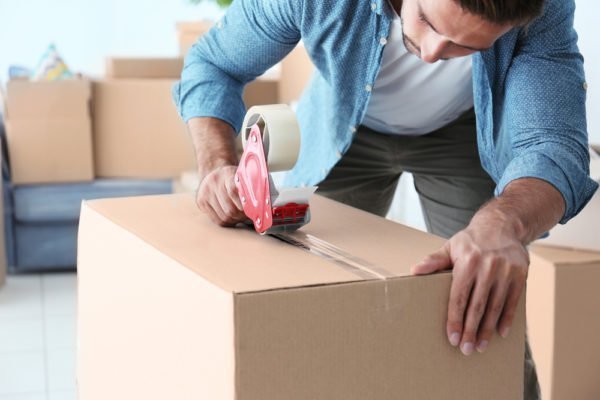A First Night Moving Box

Thinking Ahead
First Night Moving Box – Before you settle into your new home on the first night, you’ll want to have all of your essentials close at hand. A first night moving kit may be the single most important box in your move. The purpose of the first night box is to have what you need where you can easily get to it, when you need it. Below are some suggestions to help you plan your first night moving box and alleviate some of the stress that could come from digging through endless boxes just to find your toothbrush or bedsheets. Get started packing for an enjoyable first night in your new home with these helpful tips!
Moving Tip: Make sure you have not packed any items your moving company cannot transport. For a list of items United cannot move due to health or safety regulations, refer to our restricted items checklist.
Transporting Your First Night Supplies
The most important thing to know about your first night moving box is that it should travel with you, especially if you and your family are arriving at your home before the movers. If that’s not possible with your type of move (e.g., you’re flying or don’t have enough room in your car), this kit should be the last box loaded onto the moving truck. The checklists we’ve developed for your first night covers everything from electronics and chargers to toilet paper, linens and cleaning necessities. We’ve thought of everything, so you don’t have to. Searching for a clean bath towel or your comfy pajamas puts a damper on the excitement of your first night in your new home. You may need to include exactly what we suggest or put your own unique spin on it. The key is keeping everything nearby and in one place.
Cleaning & Maintenance Supplies
One of the first things you will want to do before unpacking your moving boxes is some basic cleaning. Heavy-duty cleaning can wait. On your first night in your new home, strive for a quick scrub down of necessary surfaces. This will be just enough cleaning for one night, and it will not take too long, allowing you time to get to bed at a decent hour. Along with packing cleaning supplies, it’s also a good idea to bring some toolbox standards. There may be some immediate household repairs that need attention, so preparing for that possibility can be helpful in an otherwise potentially stressful situation. You’ll have plenty of time to fix any major issues, change that outdated paint color in the kitchen and re-carpet the guest room, so focus only on your critical “punch list” items the first night.
List of items we recommend for home cleaning & maintenance on the first night in your new house:
- Cleaning rags
- Paper towels
- Cleaning solutions (can’t travel in the moving van)
- Dish soap
- Gloves
- Trash bags
- Box cutter
- Hammer
- Screwdriver and screws
- Pliers
- Drill and drill bits
- Light bulbs
- Flashlights
- Extra batteries (can’t travel in the moving van)
- Broom and dustpan
- Shower curtain and hardware (if needed)
Food & Beverages
Also, consider your eating arrangements on your first night. Your freezer and refrigerator may not be up and running on your first night and unpacking your dishes and kitchen necessities will not be on the top of your to-do list. Therefore, you may want to consider eating out or ordering in for your first few meals. Visiting your local eateries is an excellent way to get familiar with your neighborhood and helps eliminate the hassle of not only unpacking your cookware but also cleaning up afterward. If going out or delivery isn’t an option, packing a can opener along with these suggested non-perishable food items is the way to go. Keep in mind, foods that require a microwave for heating may not be usable if your appliances are not installed yet.
- Peanut butter
- Canned or pouched tuna, salmon or chicken
- Canned veggies
- Canned fruit (low sugar)
- Canned legumes such as lentils and beans
- Instant oatmeal
For snack time, pack portable, high-protein food items and lots of water to keep everyone hydrated.
Plus, you will need some paper plates, disposable cups, napkins and utensils. If you prefer reducing waste over dishwashing, bring reusable camping utensils and dishes instead of disposable.
Linens & Sleeping Arrangements
Your sleeping arrangements should also be planned with your first night box. A good night’s sleep will be critical as you embark the next few days on unpacking your belongings and settling into your new home. Be sure to have bed linens for every member of the family so everyone experiences a sense of coziness the first night. Paying close attention to everyone’s sleeping arrangements can help make the first evening as pleasant as possible. Knowing whether or not you will be sleeping on the floor the first night will help you plan. Make sure you ask your move coordinator whether the movers will assemble your beds or if you are responsible for setting them up.
The following list covers some of the other sleeping related items you may want to consider packing for your first night in your new home:
- Sheets, pillows, blankets and comforters for the beds (or a sleeping bag)
- Air mattress, folding bed or portable bed (if your primary bed is not going to be assembled)
- Air pump for the air mattress
- Hairdryer, vacuum or shop vac if you are without an air pump
Hygiene Supplies
Aside from sleeping and eating essentials, your personal items will need to be packed. Have your toothpaste and toothbrush, soap and shampoo and a brush or comb packed in your personal bag(s) along with your pajamas and next day clothing.
In addition, we suggest these personal items to pack in your first night kit:
- Toilet paper and paper hand towels
- Bath towels, washcloths
- Sleeping accessories such as a breathing machine or sound machine
- Cosmetics and other beauty items
- Personal electronic devices
- Chargers for devices, like phones and tablets
Last but not least, you will need a first aid kit for potential bumps and bruises, complete with:
- Medications
- Bandages and ointments
- Anti-itch cream
In the end, make sure your first night box is the last one loaded on the moving truck before the doors are closed — if it’s not traveling with you in your car. You’ll want to be able to get to it as soon as you arrive at your new home.
